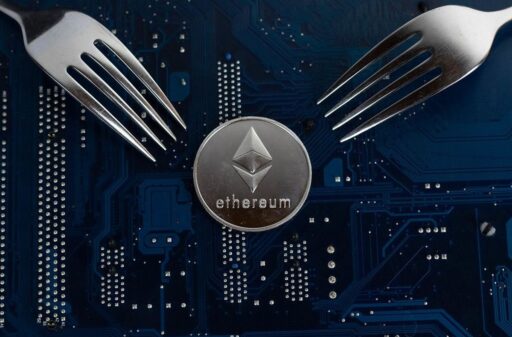The article ‘Exploring the Integration of Crypto Exchange Services in PayPal’ delves into the significant strides PayPal has made in the cryptocurrency landscape. Since its announcement in late 2020 to allow users to buy, hold, and sell cryptocurrencies, PayPal has been at the forefront of integrating crypto services into its platform. This piece explores the evolution of these services, the process of purchasing Ethereum via PayPal, the platform’s role in enhancing crypto accessibility, PayPal’s strategic direction with stablecoins, and its influence on the market and future prospects.
Key Takeaways
- PayPal has become a key player in the cryptocurrency market by enabling users to buy, hold, and sell digital assets directly through their accounts.
- The platform’s simplicity and security measures, such as buyer protection, make it an attractive option for both new and seasoned cryptocurrency investors.
- Purchasing Ethereum through PayPal is straightforward, but it’s important to consider the potential for higher fees compared to dedicated crypto exchanges.
- PayPal’s integration with stablecoins and the fee-free PYUSD remittances play signifies a strategic shift and potential growth for its Xoom service.
- With over 350 million active users, PayPal’s widespread trust and market reach position it to significantly influence cryptocurrency adoption and innovation.
The Evolution of PayPal’s Cryptocurrency Services

PayPal’s Entry into the Crypto Market
In a bold move that underscores its fintech leadership, PayPal ventured into the cryptocurrency space, signaling a significant shift in the financial landscape. The announcement in late 2020 that users could buy, hold, and sell cryptocurrencies directly through their PayPal accounts marked a pivotal moment for the company. This integration not only expanded the utility of PayPal but also paved the way for merchants to embrace crypto payments within its extensive network.
PayPal’s foray into cryptocurrency has been met with enthusiasm, thanks to its widespread acceptance and reputation for security. With over 350 million active users, PayPal’s entry into this market has been influential, offering a secure and trusted platform for the burgeoning investor and trader community. The addition of a buyer protection program for eligible crypto purchases further solidifies user trust in PayPal’s crypto services.
The integration of cryptocurrency services by PayPal represents a convergence of traditional finance and the emerging digital economy, creating a seamless experience for users around the globe.
As PayPal continues to navigate its strategic moves in cryptocurrency, it remains to be seen how this will affect its market position relative to competitors like Block and Square. However, the integration has undoubtedly made cryptocurrencies more accessible to a wider audience, potentially accelerating adoption rates.
The Impact on Merchants and Consumers
The integration of crypto exchange services into PayPal’s platform has had a significant impact on both merchants and consumers. Merchants now have access to new revenue opportunities, tapping into the growing cryptocurrency market without the need for complex infrastructure. Consumers benefit from an enhanced user experience, with a seamless interface and optimized checkout process that PayPal is known for.
- For Merchants:
- Access to a broader market
- Reduced transaction fees
- Innovative image projection
- For Consumers:
- Simplified payment process
- Diverse payment options
- Increased transaction security
The move towards cryptocurrency acceptance by PayPal is not just a strategic decision but a step towards future-proofing business operations in the digital economy.
While the volatility of cryptocurrencies like Bitcoin can make retailers hesitant to accept them, PayPal’s reputation and security measures provide a level of trust and stability. This trust is crucial for the widespread adoption of crypto payments, as it mitigates concerns over the fluctuating value of digital assets.
PayPal’s Crypto Services vs. Dedicated Exchanges
PayPal’s foray into the cryptocurrency market has been a significant step towards blending traditional financial services with the burgeoning world of digital currencies. The platform’s integration of crypto services offers a unique blend of convenience and familiarity that stands in contrast to dedicated cryptocurrency exchanges. While exchanges are evolving towards decentralization, PayPal maintains a centralized approach, providing a different set of advantages and challenges.
- Widespread Acceptance: PayPal’s extensive user base and global reach make it a formidable player in the crypto space.
- Low Fees: Compared to traditional exchanges, PayPal offers competitive fees, especially when funding accounts through bank transfers or cards.
- Security: With robust security measures and a buyer protection program, PayPal instills confidence in users engaging in crypto transactions.
PayPal’s strategic move into cryptocurrencies could signify a shift in how everyday consumers interact with digital assets, potentially streamlining the process for those new to the space.
Dedicated exchanges, on the other hand, often cater to a more crypto-savvy audience, offering advanced trading features and a wider variety of coins. However, the integration of services like PayPal could play a pivotal role in driving cryptocurrency adoption among a broader audience, leveraging its established trust and ease of use.
Navigating the Purchase of Ethereum via PayPal
Step-by-Step Guide to Buying Ethereum
Purchasing Ethereum through PayPal has been streamlined to cater to both novice and experienced users. Here’s a concise guide to help you acquire ETH using PayPal’s services:
-
Open the PayPal app and log in. Begin by accessing PayPal on your preferred device and signing in to your account.
-
Navigate to the cryptocurrency section. Locate the crypto tab to find the available cryptocurrencies for purchase.
-
Select Ethereum and enter the amount you wish to buy. Choose ETH, specify the amount, and review the transaction details, including any applicable fees.
-
Confirm the transaction. Complete your purchase by confirming the details and finalizing the transaction.
Remember, while buying Ethereum directly within the PayPal app is an option, using PayPal on a dedicated crypto exchange platform may offer additional benefits such as lower fees and enhanced security features.
Comparative Analysis of Top Platforms
When selecting a platform for purchasing or staking cryptocurrencies, it’s crucial to compare the offerings of top contenders. Key factors include supported cryptocurrencies, annual percentage yield (APY), fees, and whether the exchange is centralized (CEX) or decentralized (DEX).
| Platforms | Cryptocurrencies Supported | APY | Fees | Exchange Type |
|---|---|---|---|---|
| Coinbase | 6 | 5.75% | 0% – 3.99% | CEX |
| Binance.US | 22 | 1.2% | 0% – 3.75% | CEX |
| Crypto.com | 250+ | 8% | 0% – 4% | CEX |
| KuCoin | 50+ | 10% | 0.1% | CEX |
| Kraken | 200+ | 3% – +20% | 0% – 0.1% | CEX |
| Gemini | 47 | 4.25% | N/A | CEX |
| Nexo | 20+ | 4% – 12% | N/A | CEX |
| OKX | 250+ | 4% – 20% | 0% – 0.1% | CEX |
| Aave | 30+ | 12.22% | 0.09% | DEX |
| Cake DeFi | MATIC, ETH, DFI, DASH | 20% | 0.1% – 0.2% | DEX |
It’s advisable to conduct thorough research, read user reviews, and compare multiple crypto platforms and their products before making a final decision.
In addition to the quantitative data, qualitative factors such as liquidity, educational resources, community support, and additional features like mobile app accessibility should also be considered. These elements can significantly influence the overall user experience and success in crypto staking or trading.
Understanding Fees and Transaction Security
When engaging in cryptocurrency transactions through PayPal, understanding the fee structure and security measures is crucial. Transaction fees vary, often depending on the amount and type of transaction. PayPal’s approach to fees is competitive, aiming to provide a balance between cost and service quality.
Security is a top concern for users when dealing with digital assets. PayPal leverages its experience in payment processing to implement enhanced security protocols. These measures are designed to protect against unauthorized transactions and potential fraud.
PayPal’s commitment to security and regulatory compliance ensures that users can conduct crypto transactions with confidence.
Here’s a quick overview of the typical fee structure for crypto transactions on PayPal:
- Fixed fees: A set fee for transactions below a certain threshold.
- Percentage fees: A variable fee based on the transaction amount.
- Subscription plans: For frequent users, offering a more predictable fee model.
It’s important to note that while fees are an essential aspect of the service, PayPal’s robust security measures and regulatory compliance are equally significant in providing a safe and reliable platform for cryptocurrency exchanges.
The Role of PayPal in Expanding Crypto Accessibility

Widespread Acceptance and User Base
PayPal’s integration of cryptocurrency services has capitalized on its widespread acceptance, offering a seamless entry point for users across various geographies. The platform’s commitment to low fees makes it an attractive alternative for those looking to avoid the high costs associated with traditional funding methods.
PayPal’s Crypto Wallet introduces PYUSD stablecoin, enhancing digital asset management. Paxos Trust ensures security. PYUSD aims to streamline transactions, increase accessibility, and bridge traditional and digital economies.
The security measures and buyer protection offered by PayPal provide a layer of confidence for users engaging in crypto transactions. As digital currencies continue to permeate the retail and e-commerce sectors, PayPal’s user-friendly design and versatile cryptocurrency support position it as a key player in facilitating online transactions with a growing tech-savvy and privacy-conscious consumer base.
Low Fees and Efficient Processing
One of the most compelling reasons for businesses to integrate cryptocurrency payments is the potential for lower transaction fees compared to traditional payment methods. Crypto transactions, by circumventing traditional banking channels, can significantly reduce costs, sometimes to as low as 1% or even less. This efficiency not only benefits businesses by improving their margins but also attracts consumers looking for more economical transaction options.
In the context of PayPal’s integration with crypto services, the platform aims to leverage this advantage to enhance its competitive position. While fees for crypto transactions on PayPal are subject to change, they are generally competitive with other platforms. For example, a snippet from a recent article, ‘How to Buy Bitcoin with PayPal in 2024
- Safest Methods Revealed’, mentions Kraken’s near-instant payments with a 2.4% fee per transaction when using PayPal.
The streamlined process and the promise of lower fees are pivotal in PayPal’s strategy to make crypto transactions as seamless and cost-effective as possible for its vast user base.
Below is a simplified fee structure for various transaction methods, illustrating PayPal’s commitment to low fees:
| Transaction Method | Fee Percentage |
|---|---|
| Bank Transfer | No fees |
| Visa | 3.75% |
| MasterCard | 3.75% |
| ACH | 0.50% + 0.9% to 1.5% |
| Cryptocurrency | No fees |
Note: These rates are subject to change and may vary based on the user’s country and specific transaction details.
Security Measures and Buyer Protection
PayPal has implemented a robust framework of security measures to ensure the safety of cryptocurrency transactions within its platform. Enhanced security protocols such as advanced encryption, multi-factor authentication, and real-time fraud detection systems are in place to protect users against unauthorized transactions and potential fraud.
The commitment to security is further underscored by PayPal’s terms, which clarify that while traditional Buyer and Seller Protection does not extend to cryptocurrency transactions, users are still shielded from unauthorized activity in their Cryptocurrencies Hub. This dual approach to security—combining technological safeguards with policy-based assurances—provides a comprehensive shield for PayPal users engaging with digital currencies.
- Advanced Encryption Techniques
- Multi-Factor Authentication
- Real-time Fraud Detection
PayPal’s dedication to security is not just about technology; it’s about creating a trustworthy environment where users can engage with cryptocurrencies with confidence.
Strategic Moves: PayPal’s Integration with Stablecoins

Xoom’s Market Position and PayPal’s New Direction
As PayPal navigates a strategic pivot under the leadership of CEO Alex Chriss, the integration of stablecoins, particularly PYUSD, emerges as a potential catalyst for growth. Xoom, operating as PayPal’s international P2P payment service, has traditionally been positioned at a premium price point, with less organic engagement compared to competitors. The introduction of fee-free PYUSD remittances could mark a significant turning point for Xoom’s market appeal.
The recent announcement by Jose Fernandez da Ponte, SVP of Blockchain, Crypto, and Digital Currencies at PayPal, signals the most noteworthy product development for Xoom in years, with a launch anticipated in mere weeks.
The potential synergies between PYUSD and Xoom are manifold, and the pairing could redefine the remittance landscape. Here’s a glimpse at the topics that underscore the importance of this strategic move:
- Xoom’s current standing in the remittance market
- The development and market capitalization of PYUSD
- The implications of stablecoin integration for Xoom’s pricing structure
- The broader impact on PayPal’s cryptocurrency holdings
- The inception of a novel strategic direction for PayPal and Xoom
The Fee-Free PYUSD Remittances Play
In a strategic move to revitalize its remittance service, PayPal has introduced fee-free transactions using its stablecoin, PYUSD, for Xoom users. This initiative is poised to enhance Xoom’s market position by leveraging the growing popularity of stablecoins for international transfers.
Senders can now fund remittances with PYUSD without incurring transaction fees, ensuring that more money reaches the intended recipients. The process remains straightforward for receivers, who will get their funds in local currency through their preferred channels, such as bank accounts or mobile wallets.
The table below outlines the key benefits of using PYUSD for remittances via Xoom:
| Benefit | Description |
|---|---|
| Fee Elimination | No transaction fees for remittances funded by PYUSD |
| Simplified Experience | Recipients receive funds in local currency without additional steps |
| Enhanced Value | More funds are delivered due to the absence of fees |
By eliminating fees for stablecoin-funded remittances, PayPal is not only making a significant play to grow Xoom but also setting a new standard for cost-efficiency in the remittance industry.
Potential Impacts on Xoom and PayPal’s Ecosystem
The integration of PayPal’s stablecoin, PYUSD, with Xoom’s remittance services marks a pivotal shift in strategy, potentially revitalizing Xoom’s market position. This move could signal a new era for Xoom, enhancing its competitive edge in the high-stakes remittance market.
- Xoom’s integration with PYUSD may lead to:
- Increased organic engagement due to fee-free remittances.
- Enhanced market growth through the appeal of stablecoin transactions.
- A redefined value proposition that could attract a new customer segment.
The synergy between PYUSD and Xoom could redefine the remittance landscape, offering users a more cost-effective and stable means of transferring funds internationally.
With the announcement of fee-free stablecoin-based remittances, Xoom is poised to disrupt the traditional remittance model. The potential for increased volumes and growth through this strategic pairing is substantial, as it aligns with the growing trend of digital currency utilization for cross-border payments.
Assessing PayPal’s Market Influence and Future Prospects
PayPal’s User Trust and Cryptocurrency Adoption
PayPal’s foray into the cryptocurrency market has been met with enthusiasm, largely due to its established reputation for security and reliability. With over 350 million active users worldwide, PayPal’s integration of crypto services has the potential to significantly boost cryptocurrency awareness and adoption. The platform’s widespread acceptance and user trust are pivotal in transitioning crypto from niche to mainstream.
- Widespread Acceptance: PayPal’s global reach provides accessibility to a diverse user base.
- Low Fees: Compared to traditional funding methods, PayPal offers a more cost-effective solution.
- Security: The buyer protection program and robust security measures instill confidence in users.
PayPal’s move into the crypto space is not just about adding another asset class; it’s about creating a more inclusive financial ecosystem. The buyer protection program, in particular, adds a layer of security that is appealing to both new and seasoned crypto enthusiasts.
While the integration of cryptocurrencies into PayPal’s services has been a strategic move, it is important to note that security concerns and regulatory uncertainty are still significant barriers to wider adoption. However, PayPal’s commitment to providing a secure and user-friendly platform may help to mitigate these concerns over time.
Buyer Protection in Crypto Transactions
PayPal’s commitment to security is a cornerstone of its services, extending to its cryptocurrency offerings. Buyer protection in crypto transactions is a critical aspect that differentiates PayPal from many other platforms. Users benefit from safeguards against unauthorized transactions and fraud, which is particularly important in the digital currency space where chargebacks are not typically possible.
- Security measures include real-time fraud monitoring and advanced encryption.
- Buyer protection policies provide reimbursement for unauthorized transactions.
- The blockchain’s inherent security complements PayPal’s systems, creating a robust defense.
PayPal’s integration of blockchain technology with its existing security protocols offers a unique layer of protection, ensuring that users can engage in crypto transactions with confidence.
While cryptocurrencies inherently offer a degree of anonymity and security, PayPal enhances this with additional measures designed to protect users’ financial information and identity. This dual approach to security not only attracts privacy-conscious consumers but also positions PayPal as a trusted intermediary in the crypto market.
Prospective Growth and Innovations
As PayPal continues to navigate the ever-evolving landscape of digital finance, its role in the cryptocurrency domain is poised for significant expansion. The exploration of various aspects of cryptocurrency by entities like Team CryptoMeaning underscores the potential for platforms like PayPal to innovate and adapt. With a focus on user trust and a history of secure transactions, PayPal is well-positioned to capitalize on emerging trends and technologies in the crypto space.
- ACCESS TO NEW CUSTOMER SEGMENTS
- INNOVATIVE BRAND IMAGE
These factors, combined with PayPal’s ability to offer low fees and efficient processing, suggest a bright future for the company in the realm of digital assets. Moreover, PayPal’s integration with stablecoins and other digital currencies could further cement its market position as a leader in financial technology.
Embracing crypto payments is not just a strategic move—it’s a leap towards future-proofing operations.
As we look ahead, the potential for PayPal to introduce new features, enhance buyer protection in crypto transactions, and expand its user base is substantial. The company’s commitment to innovation will likely drive growth and set new standards in the industry.
Conclusion
In summary, PayPal’s foray into the cryptocurrency space marks a significant milestone in the financial industry, bridging the gap between traditional online payments and the burgeoning world of digital currencies. With its vast user base, reputation for security, and the convenience it offers, PayPal is poised to play a pivotal role in mainstreaming crypto transactions. While there are trade-offs in terms of fees and the range of options compared to dedicated crypto exchanges, the integration of crypto exchange services within PayPal offers a compelling proposition for users seeking a trusted and accessible platform. As the landscape evolves, PayPal’s continued innovation, including the potential growth of Xoom with stablecoins, could further cement its position as a key player in the crypto exchange market.
Frequently Asked Questions
When did PayPal start offering cryptocurrency services?
PayPal announced the integration of cryptocurrency services in late 2020, allowing users to buy, hold, and sell cryptocurrencies directly through their PayPal accounts.
How does PayPal’s buyer protection work for cryptocurrency purchases?
PayPal offers a buyer protection program that covers eligible purchases made using cryptocurrencies, providing an extra layer of security for users.
What are the benefits of using PayPal for cryptocurrency transactions?
Using PayPal for cryptocurrency transactions offers widespread acceptance, low fees compared to traditional funding methods, and robust security measures including buyer protection.
Can you buy Ethereum with PayPal on major exchanges?
Yes, you can buy Ethereum with PayPal on major exchanges like Binance, Coinbase, Bitstamp, and Plus500, each offering different features and levels of PayPal integration.
Are there any fees associated with buying Ethereum on PayPal?
While buying Ethereum on PayPal is convenient, there are fees deducted during the transaction. PayPal may have higher fees compared to dedicated cryptocurrency exchanges due to markups.
What is the significance of PayPal’s integration with stablecoins and Xoom?
PayPal’s integration with stablecoins, particularly through the fee-free PYUSD remittances play, is a strategic move to enhance Xoom’s market position and potentially boost PayPal’s ecosystem.





